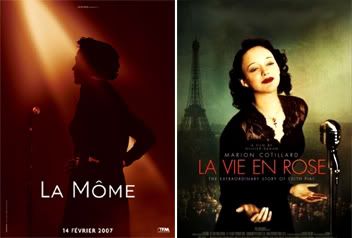Cine Europa: La Môme (the Kid) - La Vie En Rose (Life As A Rose)

I'll be reviewing one movie a day while the European Union Film Festival (10th Cine Europa) is ongoing. Yesterday's best movie is "La Môme," released in the US as "La Vie En Rose." A 2007 (released last June) French language movie directed by Olivier Dahan about singer Édith Piaf (perfectly played by Marion Cotillard). The movie premiered at the Berlin Film Festival. Co-stars include film veteran Gérard Depardieu, Sylvie Testud, Emmanuelle Seigner, Clotilde Courau newcomer Jean-Pierre Martins and respected character actor Pascal Greggory.

Edith Piaf was born Édith Giovanna Gassion in Paris, France; her mother worked as a cafe singer and her father was a well-known travelling acrobat. Abandoned by her mother, she was raised by her paternal grandmother, who ran a brothel in Normandy. From age 3 to 7, she was blind. As part of Édith Piaf's legend, she allegedly recovered her sight after her grandmother's prostitutes went to a pilgrimage to Saint Thérèse de Lisieux. Later she lived for a while with her alcoholic father, whom she left by age 15 to become a street singer in Paris.-www.edithpiaf.com-
The movie has an intertwined timeline of Edith's life, from her childhood beginnings, peak of her career, latter life and back. The film presents a non-linear series of her life's key events. Scenes often jump back and forth across decades, but her childhood take up much of the first part. Her story as an extreme or yet hardcore alcohol addict stretches from teenage life until her death, portraying a well-seen if not typical nature of a European artist, who after all the depression and almost hell-like condition of personal life, still delivers their talent flawlessly.

The movie's cinematography and production aspects are flawless. Performance scenes of Edith singing her songs around the world are extremely moving if you're a classical ballad music lover. Her singing reflected her tragic life, with her specialty being the poignant ballad performed in a heartbreaking voice. "Hymne à l'amour" (Anthem with the love, 1949), was heard for less than 10-seconds but didn't fail to make me feel the impact since after realizing it as one of Josh Groban's rendition song I liked. The movie ends with her death, and the performance of what is perhaps her signature song, "Non, je ne regrette rien" (No, I do not regret anything), wrapping up her moving life's story.
For almost all the performances in the movie: Heaven Have Mercy, Milord, Rien de rien, La foule, Cri du cœur, La vie en rose (English version), Padam Padam, Mon Dieu, Hymne à l'amour, Mon manège à moi, Non, je ne regrette rien), the original recordings of Piaf were used as they thought it impossible to replicate her uniquely distinct voice and because Olivier Dahan said he wanted to keep it the most authentic sounding as possible except for 3 songs performed by Parigote singer Jil Aigrot : Mon Homme, Les Mômes de la Cloche, Les Hiboux.-wikipedia trivia-
It's not just Cotillard's performance that is astonishing. Those who can't see the brilliance in the rest of this film need to go back to film school. -Boo Allen
An astonishing performance by Marion Cotillard as the legendary French chanteuse Edith Piaf whose life was a rollercoaster ride of exhilarating highs and incredibly depressing lows. -Frederic and Mary Ann Brussat
You should regret missing it. -Gina Carbone
It maybe perhaps one of the best biographical films so far. It’s so touching and emotional that you really feel the agony and desperation the character is living. The cast is simply magnificent, everyone's acting is flawless especially from Marion Cotillard that with this role she is giving, maybe the performance of her life because she's not only performing a character, she's clearly living it to the fullest.
Wikipedia - Edith Piaf
Official Movie Website
Official US Movie Website
My Rating:
This post is a review post from my Angel's Hub Reviews via Multiply.


















1 Comments:
La Vie en Rose means "life in pink" not "life as a rose"
Post a Comment